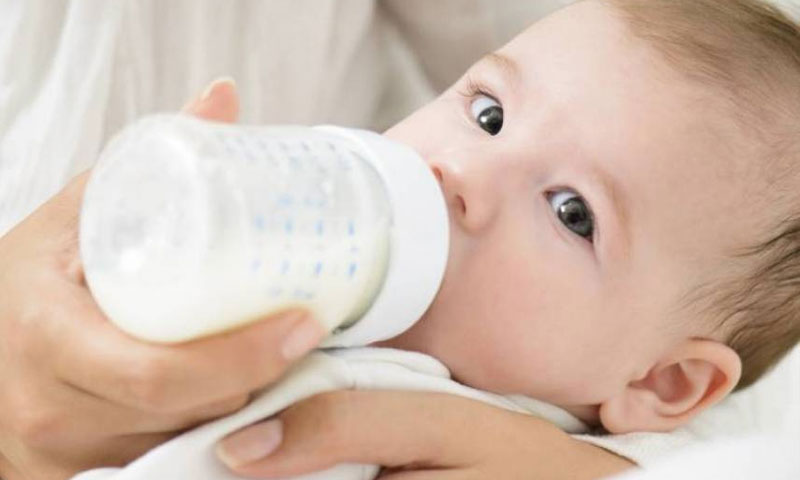Idlib – Shadia al-Ata’a
Syrian breastfeeding mothers in the northern Syrian camps are suffering from a lot of challenges; most prominent of which is the scarcity of synthetic formula, which is present in the organizations’ projects and plans but not in infants’ mouths.
Neither natural nor manufactured: starch rice is a nutritional alternative
Islam, who came from the eastern countryside of Hama, was forced to stop breastfeeding after setting up in the Sarha camp for the displaced in rural Idlib because the escalation of military violence in the region led to her milk disappearance due to fear and panic. She found herself among a group of breastfeeding women who were denied breastfeeding their children.
According to Islam, the lack of formula milk from camps that families of the displaced had previously received “added insult to injury”. However, the only nutritional alternative for infants is almost absent today.
“I came with my children, including a newborn, to the camp due to the recent escalation in the area. Since I arrived at the camp, I have not had any help, including infant formula,” says Islam to Enab Baladi.
Breastfeeding women resorted to nutritional alternatives, the most prominent of which was the rice starch that was adopted by Souad Al-Ahmad, who was displaced in the Amal al-Laban camp in Idlib countryside. However, the camp hospital was waiting for her two children to come up with a medical report revealing that the two children are lacking important nutrients, as well as intestinal infections caused by a food source.
Stopped for two years and no statistics
Enab Baladi reached out ten camps in the Idlib countryside to ask about the continued arrival of milk to infants, but the answer was that the majority of the camps have not received formula through relief baskets nearly for two years.
According to the “Syria Response Coordinators team”, since November 2019 to this January, the number of children arriving in the camps is estimated at 156,433 children, while the organization did not clarify the number or percentage of infants among them “due to the difficulty to collect data.”
Malnutrition and growth failure
Doctor Muhammad al-Hallaq, a pediatrician from Kafr Nabl in the southern countryside of Idlib, told Enab Baladi that the medical cases that he diagnosed included malnutrition, growth failure, and vitamin and iron deficiency.
According to the doctor, milk might lack the nutritional supplements that a child needs. He added that milk which is distributed across organizations also lacks protein and albumin. This causes edema and inflammation in the child’s intestine.
The doctor pointed out that the problem is due to the percentage of sugar “lactose” found in milk. Some children are unable to tolerate the sugar in their daily milk, which causes them to have health complications such as diarrhea, or as a result of consuming milk that does not meet the specifications.
“Milk is not absent … only suspended”
Abdel-Razzaq Abdel-Qader, a nutritionist in UOSSM organization, explained to Enab Baladi that the distribution of milk has been suspended for the organization since February 2019, noting that despite the limited availability of milk, it is provided for supporting the process of generating milk for mothers who stop breastfeeding.
Abdel Qader pointed out to the organization’s criteria according to which milk is distributed. These criteria include the absence of the mother (death, divorce …), the state of trigeminal twins, a disease that prevents the child from obtaining breastfeeding (harelip, taking neurological medicines).
However, the organization’s nutritionist pointed to difficulties facing the distribution of milk even with its scarcity. These obstacles include the recipient’s falsification of the identification documents from local councils, such as providing a divorce card or a medical report that authorizes the child or his family to obtain the formula.










